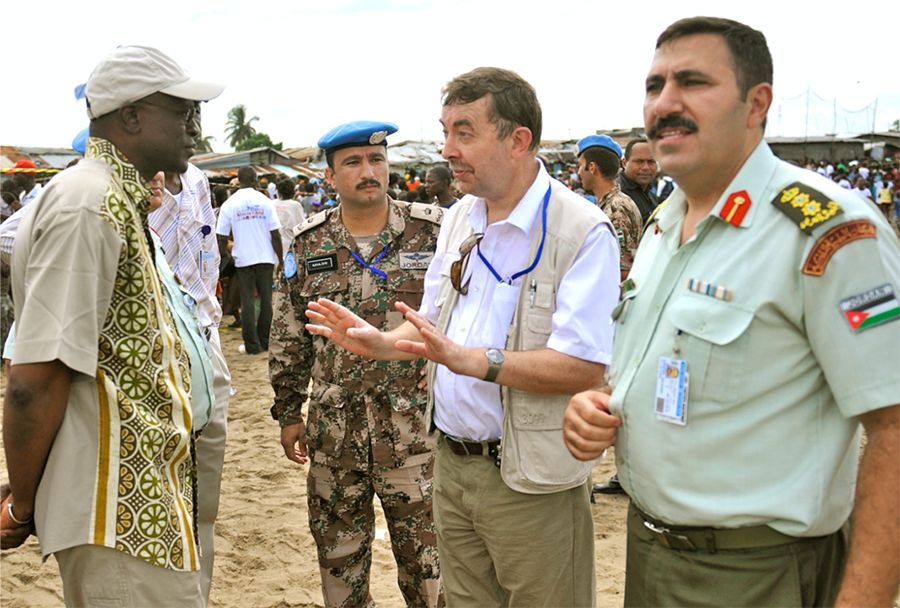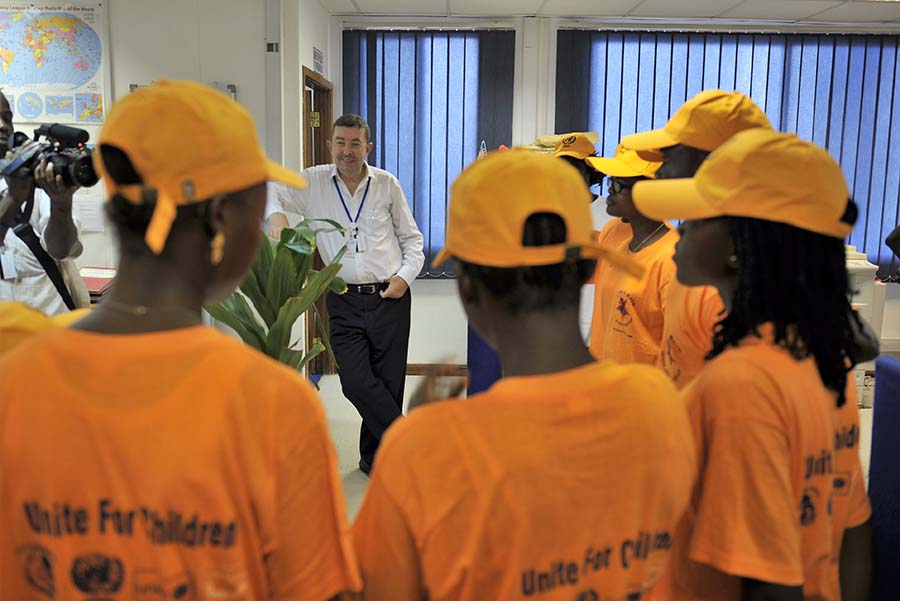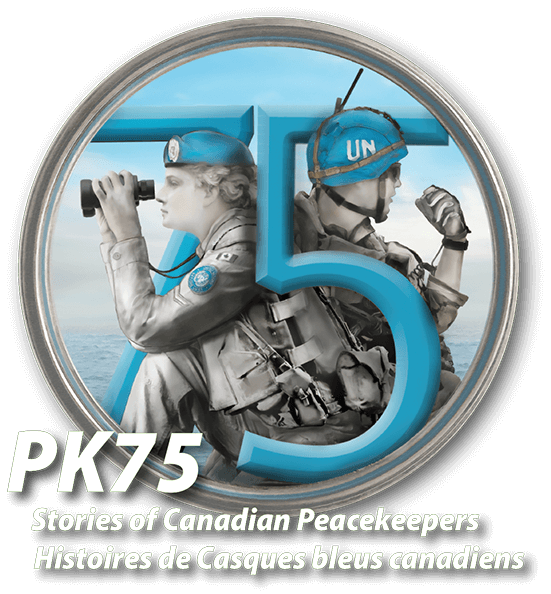

Vancouver, BC, Canada
George Somerwill
Current Location: Vancouver, BC, Canada
In August 2003 Liberia’s brutal 19-year civil war officially ended with a Comprehensive Peace Agreement. Following Security Council Resolution 1497 (2003) a stabilization force deployed known as the UN Mission in Liberia (UNMIL). The country was in ruins with little functioning infrastructure, no functioning government and a complete breakdown of law and order. Close to 250,000 Liberians had died since the early 1990s. Worse, a generation of the nation’s best and the brightest had fled either as refugees to other parts of West Africa or to the USA. UNMIL was faced with several major tasks. At its highest staffing levels up to 15,000 military and more than 1100 police officers as well as up to 700 civilians, ensured security, helped to heal the wounds of conflict, prepared for elections and supported the new government.
Since the mid-nineties the UN DPKO had recognized the importance of developing robust civil-society communications and outreach policies, using Mission Public Information Offices, to reach out to conflict-affected communities. The goal was to use modern communications methods to counter propaganda, foster reconciliation and provide unifying messages targeting former combatants and youth. Right from the start, UNMIL leadership prioritized messaging promoting peace and reconciliation and encouraging a strong political role for women in the new Liberia, which, after the 2005 election, was led by Africa’s first democratically elected woman president, Ellen Johnson Sirleaf.
UNMIL in 2003 was one of the earlier missions where, from its inception, a policy of social engagement and outreach was rapidly implemented using a number of communications channels. The key to its success was UNMIL Radio. Led by a veteran Ghanaian broadcaster and a small team of international managers, it was staffed mostly by young Liberians. It reached most of the Liberian population with an eclectic mix of music, news, and messages fostering peace and reducing the culture of war.
Liberia has a strong oral tradition of community engagement and early in UNMIL’s roll-out, the Public Information Office staffed up a Community Outreach section. Led by a Nigerian, and mostly staffed by a group of talented young Liberians, the Outreach Section was a creative dynamo. Graphic artists, photographers, musicians and a side-splitting comedian, known as Boutini, who wove serious UNMIL messages into his jokes, all combined to present many memorable events to enthusiastic audiences! The international amputee soccer championship match between Liberia and Sierra Leone was as fast as any European Premier League game. The annual Peacekeepers Day when several hundred Monrovia high school students attended an Open Day at UNMIL HQ led to demands from young women for an all female Liberian Formed Police Unit like UNMIL’s own Indian all-female FPU. The UN’s annual worldwide 16 Days of Activism against Sexual and Gender-Based Violence encouraged all young Liberians to fight this scourge together. This was especially important after a conflict that had seen an epidemic of sexual and gender-based violence.
But the most popular UNMIL outreach event by far was an annual nationwide talent contest known as “A Star is Born Under-20 Talent Hunt.” The most coveted award each year was a recording contract with a well-known Liberian record producer. For the early rounds of each contest UNMIL PIO worked closely with military colleagues to identify the best regional talent. Other contestants came from Monrovia and in some cases had already performed elsewhere such as UNMIL Radio. Excitement ran high from Harper in the south-east to Voinjama in the north-west of the country. Performers and young audiences enthusiastically embraced UNMIL’s peace and reconciliation messaging. Instruments were polished. UNMIL amplifiers were borrowed and talented young Liberians practiced until they lost their voices.
The night of the annual “Star Is Born” final held in Monrovia was a glittering affair. Word got around that it was one of the year’s “must see” events. President Ellen Johnson Sirleaf and the UN Special Representative attended and presented the awards. Some of the winners, most notably Moses Swaray, not only went on to achieve success throughout West Africa but personally helped improve attitudes towards Liberia’s albino population. In her 2009 State of the Nation address, President Ellen Johnson Sirleaf singled out the annual UNMIL “Star Is Born” event as an example of how the UN was helping develop Liberian youth.
UNMIL left Liberia in 2018. Over 15 years it had been one of the UN’s most successful missions. The mission was always popular with Liberians, but it also had broad international political support, strong military and civilian leadership and enthusiastic cooperation and camaraderie between military and civilian colleagues.
Biography
George Somerwill grew up and was educated in Britain and Africa. After graduation from the University of Cape Town in 1973 he worked as a journalist in London for the BBC African Service. Immigrating to Canada in 1976, George joined the CBC where he worked for 13 years in As It Happens, CBC Paris, and CBC Radio News.
Following a year as a communications specialist with what was then called the Canadian International Development Agency (CIDA), in 1991, George joined CARE Canada based in Robert Mugabe’s Zimbabwe. Later based in Nairobi, he frequently escorted journalists into Somalia and Angola. The former was then dominated by a warlord, the self-styled ‘General’ Aidid, while the latter was in the midst of a bloody but stalemated Cold War-era civil war.
In 1994, as Africa’s Great Lakes region started its descent into genocidal chaos, George found himself supporting CARE’s activities in Burundi and the DRC. The Rwandan population was on the move. The Hutu majority turned on the Tutsi minority and their moderate Hutu allies. Hundreds of thousands were murdered across the country. The soundtrack to this genocide were racist radio broadcasts emanating from the Hutu-owned and operated Radio Mille Collines (Radio A Thousand Hills). Day and night, across much of the region Hutu nationalists exhorted their compatriots to “kill the [Tutsi] cockroaches.” A Tutsi-led army, bent on revenge advanced, eventually successfully, on Kigali. As Hutu genocidaires and their families fled from the advancing army into Eastern Zaire (now the Democratic Republic of the Congo) George helped CARE to keep world media and donor attention focussed on the humanitarian disaster.
George worked in emergency programming with CARE in Angola from late 1994 to 1996. In March that year he was recruited to join UNAVEM III by the United Nations Department of Peacekeeping Operations (DPKO). He managed two demobilization Quartering Areas (QA) as a Demobilization and Reintegration Technical Officer. One, Ntuco, was close to the border of Zaire (now DRC) and the other was in southern Angola at Licua close to the Namibia border. Each QA was made up of UN civilians, a small UN military contingent for security, and up to 5,000 UNITA fighters accompanied by their families.
In 1998, while taking up a humanitarian post with the UN Oil-For-Food Programme (OFFP) in Saddam Hussein’s Iraq, George was asked to take over as Baghdad spokesperson and Head of Public Information for the OFFP. It was a difficult three years not least because of the high media interest in the Iraq story. Trying to deal with the world’s media while the Security Council was irrevocably split on how to deal with Iraq, meant that the Baghdad spokesperson supported by New York, had to walk a tightrope between powerful and opposing political interests.
In early 2002, as Afghan refugees poured into Pakistan following the events of 9/11, George served in a communications role with UNICEF Pakistan. In mid-2003, he returned to United Nations peace operations and to the Horn of Africa, to serve in the UN Mission in Ethiopia and Eritrea (UNMEE) as Deputy Chief of PIO based in Addis Ababa. From late 2004 to 2007, as the UN struggled to bring the warring parties of North and South Sudan together, George joined the fledgling UN peacekeeping mission based in Khartoum to set up a Public Information (Communications) unit for the UN Mission in Sudan (UNMIS).
George ended his UN career with the UN Mission in Liberia (UNMIL), where he served as Chief of Communications from 2007 to 2011. The UN had brought an end to fourteen years of brutal civil conflict in 2003. In January 2006 Ellen Johnson Sirleaf became Africa’s first democratically elected woman president ensuring that UNMIL was widely accepted within the country and within the international community. Backed by a supportive UN Security Council, and a successful peacekeeping mission, President Johnson Sirleaf led Liberia until January 2018.
George Somerwill continued to do consulting work until 2016, as part of a Global Peace Operations Initiative team training mid-level Asian military officers to be UN contingent commanders. He currently serves as a past-President on the Vancouver Board of the UN Association in Canada (UNAC) and is Vice-Chair of the Board of MOSAIC, a Vancouver-based immigrant services organization.
George Somerwill has an MA in Post-Conflict Reconstruction and Development, from the University of York (UK).

UN Peacekeepers Day 2009 Open Day at UNMIL HQ Monrovia.

High School students UN Day visit to UNMIL HQ, Monrovia.


